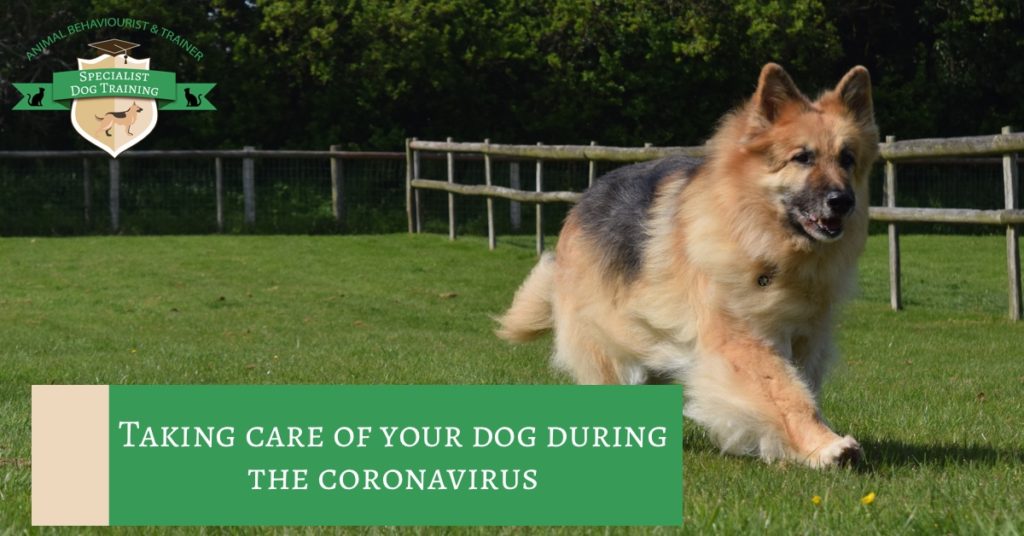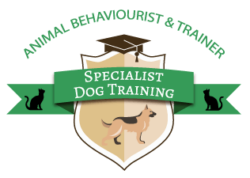
With the current climate of worry and anxiety attached to the Covid-19 crises and the events and situations changing daily due to this pandemic, self-isolation creates an extra set of concerns and problems for dog owners to overcome. It’s essential during this time that dogs don’t get bored (and we thought keeping ourselves entertained was thought provoking enough!). Bored dogs don’t cope well with little stimulation each day and if this starts to happen, behavioural problems may start to occur. We at Specialist Dog Training decided to collate some information together to help owners, dogs and puppies, whether it’s supplementing normal activities with new ones to keep dogs entertained and stimulated or essential guidance on preventing behavioural or anxiety problems.
The Daily Walk:
If you are not self-isolating:
- Fresh air each day is good for us all and at present, the government guidelines allow us to exercise once a day for one hour, so if you have more than one person in the household, take it in turns to walk the dog outside (it might be a nice break from those in your household too!).
- Due to social distancing rules in place, ensure you keep your dog under control when out on a walk – if you can’t, keep them on a lead to avoid situations that results you in breaking the current rules.
- The current pandemic means that walking a dog in crowded areas is not possible, which may mean that your walking your dog in a different environment to usual. Be sure to explore different walking routes around your house using websites such as ‘mapmywalk.com’.
If you are self-isolating:
- Dogs are still allowed out of the house, even if you are not. The Government guidelines allow you to ask someone in your world to take your dog out for you, but ensure you follow social distancing guidelines.
- If you do not have anyone to walk your dog then they will not be able to go for a walk, but they can use your private garden or just outside the front door for toileting purposes and fun games. You can also keep dogs entertained indoors with some indoor games and food activity toys.
Some activities to carry out on the walk:
- Small games of fetch – if you cannot let your dog off lead, then use an extra long lead for short fetch games. You can use toys, balls, large biscuit treats, frisbees or whatever their favourite toy is to play fetch.
- Carry out some training on lead such as sits/downs/stays/focus training, all helping to keep your dog motivated and focused on you.
- Allow your dog to stop and sniff when they are out on their walk – this will allow them to carry out their natural behaviours.
- Vary your walk, if you walk in one direction one day, reverse the walk for the other, or include other roads and pathways on your walk.
Maintaining social opportunities for our dogs during this time can be difficult. However, here are some ideas to put in place during this time:
- The environment when out on walks can include different textures – grass, uneven pathways, pavement walks and wet and dry conditions. Think about walking your dog at different times of the day too, varying between the morning, afternoon (if not too hot), evening and during dusk hours.
- Sounds or lack of in comparison to usual… this may be a quieter time but get your dog used to walking where traffic will pass as this can help them adapt. There may be more sirens than usual, so stop and let your dog watch and observe the sound, ensure to pair it with tasty treats.
- If you encounter cars, bicycles, skateboards and pushchairs on your walk, stop and allow your dog to observe from a safe distance.
- People… even though we have to maintain a safe distance from each other, you can still be civil and pass the time of day. Get your dog to sit by you whilst you exchange a short hello with passers-by and reward your dog for being calm and relaxed. Remember, this teaches them much more than just sitting and waiting, this teaches them about boundaries around strangers, calmness and focus on you the owner, etc.
- This is also a good opportunity to continue to expose your dog to other dogs at a safe distance. Use the other dogs as a distraction for training, pair the other dogs with some tasty treats.
Daily Routines:
Inside the home is just as important as being outside on a walk. Continue to have boundaries, routines and fun with your dog inside the home.
The family inside the home; if you are living with other people, take advantage and get everyone involved. Quality time with everyone playing, feeding, grooming, handling and training the dog establishes a bond with all family members. Plus, it teaches your dog how to interact with different people (small people, children, elderly etc).
Household sounds may be more frequent than usual now that we are all at home, noises such as washing machines, microwaves, TV sounds, interactive video groups, facetime / skype / zoom with relatives, and so on. This is an essential time to ensure our dogs or puppies have a safe space to chill out, away from the busy household and day to day routines.
Ensure you plan ahead with dog food and treats, your circumstances may change, and you may not be able to go outside to purchase dog food or secure yourself with an online delivery spot. If you can’t get your usual dog food, introduce the new brand that you can get slowly by mixing small amounts of the new brand in with the usual dog food. You can then increase the quantity of the new dog food gradually over the weeks. Some dog food companies that we can recommend, and who are doing deliveries, are Feelwells in North Yorkshire
(https://www.feelwells.co.uk/ ) and Natural Selections in Gravesend (https://www.natural-selections.co.uk/).
Games for your dog inside the home:
- Stuffed activity feeders to keep them busy around mealtimes or if nice, out in a garden for snacks.
- Teach your dog some tricks – go to bed/mat, high five, give paw, play bow, reversing, etc. Always teach your dog/puppy with lots of help as this keeps the frustration and stress levels at a minimum.
- Play hide and seek – give everyone some treats or a kibble and then take it in turns hide and call the dog – remember to reward your dog lots for success.
- Hone your training skills with your dog using positive reinforcement training.
- Take part in our 7-day challenge with your dog, you can find this over on our website, YouTube and Facebook page.
Learning to be alone:
With being at home 24 hours a day, seven days a week this may start to have an impact on our dog’s behaviour as they could start to become highly dependent on human company. It can be common for dogs to develop anxiety or separation related distress after owners have been at home due to a change of job, operations, prolonged illness, etc. So, when things get back to normal, it’s extremely common that the dog cannot cope. Start now to help your dog readjust, this will help when restrictions start to be lifted.
To teach your dog that it is ok to be alone, you can put in place the following:
- If they use a crate or pen area – have specific times of the day where your dog can relax in this area – after a walk place your dog or puppy in the crate/pen and feed them their meal or give them a stuffed activity feeder.
- Remember, if you are going upstairs, when you walk into rooms, do not allow your dog or puppy to follow, ensure you shut the door and when you appear again, do not make a fuss of the dog. This teaches your dog not to become anxious when a closed door is between you and your dog.
- When you are preparing a meal, have your dog lay in its bed or on a mat in another room with a tasty chew.
- Whilst leaving home is not easy at the moment due to restrictions in place, it might be useful to actually leave the home, going for a short midday walk, while another member of family carries out the designated dog walk.
Above all stay safe and keep well.
